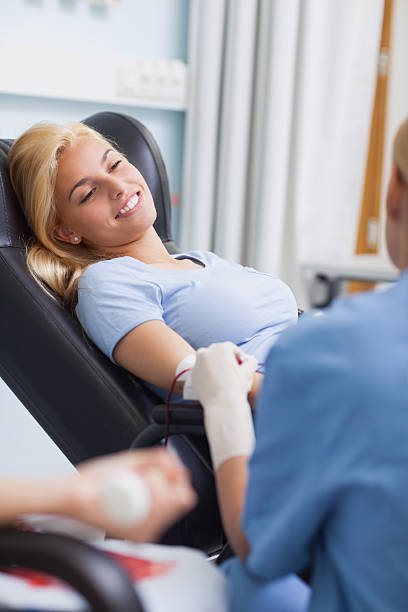The Importance of Donating Blood
Donating blood is a simple yet profound act that can save lives. Every day, countless individuals require blood transfusions due to surgeries, accidents, medical conditions, and other emergencies. Blood donations are essential to ensure that hospitals and medical facilities have a steady supply to meet these needs. This article explores where to donate blood, the benefits of donating, and what to expect during the process.
Understanding Blood Donation
Blood donation involves giving a small amount of your blood to help those in need. The donated blood is typically separated into components such as red cells, plasma, and platelets, each of which serves different medical purposes. Red cells are often used in surgeries and trauma cases, plasma can help with clotting disorders, and platelets are crucial for cancer patients undergoing chemotherapy.
Finding Blood Donation Centers
When looking for a place to donate blood near you, several options are available. Blood donation centers are often operated by organizations such as the American Red Cross, local hospitals, and community health organizations. These centers are equipped with the necessary facilities and trained staff to ensure a safe and efficient donation process.
How to Locate Donation Centers
- American Red Cross: The American Red Cross is one of the largest blood collection organizations. Their website provides a user-friendly tool to locate nearby donation centers and schedule appointments. You can also call their helpline for assistance.
- Local Hospitals: Many hospitals have their own blood donation programs. Contact your local hospital to find out if they accept blood donations directly. Hospital websites often have information about donation drives and schedules.
- Community Blood Banks: Community blood banks operate independently or in partnership with local healthcare providers. They frequently organize blood drives at various locations, making it convenient for donors to participate.
- Mobile Blood Drives: Mobile blood drives are another excellent option. These are often organized in collaboration with businesses, schools, and community organizations. Mobile units visit different areas, allowing donors to give blood without having to travel far.
Preparing for Blood Donation
Before donating blood, it's important to prepare properly to ensure a smooth process. Start by ensuring you are in good health. Avoid donating if you are feeling unwell or have any infections. Stay hydrated by drinking plenty of water on the day of your donation. Eating a healthy meal before donating can help maintain your blood sugar levels and prevent dizziness.
The Donation Process
The blood donation process is straightforward and typically takes about an hour from start to finish. Upon arrival at the donation center, you will be asked to complete a health questionnaire. This helps ensure that you are eligible to donate and that your donation will be safe for recipients.
Next, a trained staff member will check your vital signs, such as blood pressure, pulse, and hemoglobin levels. If everything is in order, you will proceed to the donation area. A sterile needle is used to draw blood from your arm. The actual donation takes about 10-15 minutes, during which you will donate approximately one pint of blood.
After donating, you will be asked to rest for a few minutes and have some refreshments. This helps your body start replenishing the donated blood and ensures you feel well before leaving the center.
Benefits of Donating Blood
Donating blood has numerous benefits, both for the donor and the recipients. For recipients, donated blood can be a lifeline, providing critical support during medical emergencies and treatments. For donors, the act of giving blood can have positive health effects. It helps reduce iron levels in the body, which can lower the risk of heart disease. Donating blood also stimulates the production of new blood cells, which can enhance overall health and vitality.
Common Concerns and Misconceptions
Many people have concerns and misconceptions about donating blood. One common concern is the fear of needles. While the idea of a needle may be intimidating, the discomfort is usually minimal and brief. The satisfaction of knowing you have helped save lives often outweighs the momentary discomfort.
Another misconception is that donating blood is time-consuming and inconvenient. However, the entire process typically takes less than an hour, and many donation centers offer flexible hours to accommodate busy schedules. Additionally, mobile blood drives make it even more convenient to donate without disrupting your day.
Eligibility Criteria
To ensure the safety of both donors and recipients, there are specific eligibility criteria for donating blood. Generally, donors must be in good health, at least 17 years old (or 16 with parental consent in some areas), and weigh at least 110 pounds. Certain medical conditions, medications, and travel history may temporarily or permanently disqualify individuals from donating. It's essential to review the eligibility criteria provided by the donation center before scheduling an appointment.
The Impact of Regular Donations
Regular blood donations are crucial for maintaining a stable blood supply. Blood has a limited shelf life, so continuous donations are necessary to ensure that there is always enough available for emergencies. By becoming a regular donor, you can make a significant and ongoing impact on the lives of those in need.
Encouraging Others to Donate
One of the most effective ways to increase blood donations is by encouraging others to donate. Share your donation experience with friends, family, and colleagues. Use social media platforms to raise awareness about the importance of blood donation and to share information about local blood drives. By spreading the word, you can inspire others to join you in making a lifesaving difference.
Conclusion
Donating blood is a selfless act that can save lives and support medical treatments for those in need. By finding a nearby donation center, preparing properly, and understanding the donation process, you can make a significant impact on your community. Regular donations and encouraging others to donate can help ensure a steady blood supply for emergencies and medical treatments. Your contribution can make a difference and bring hope to those facing critical health challenges.




